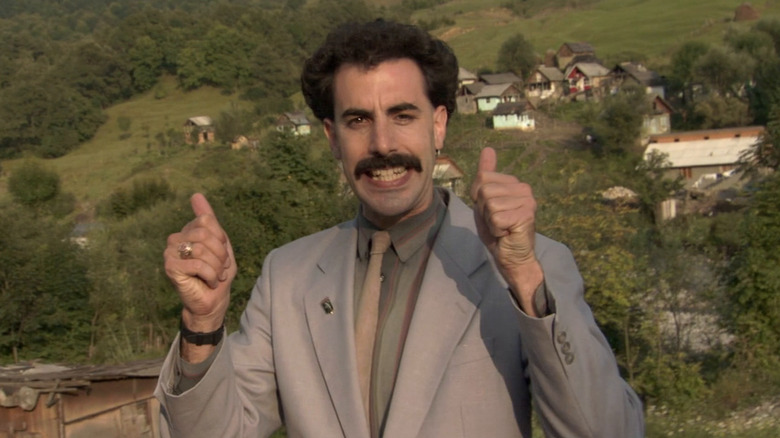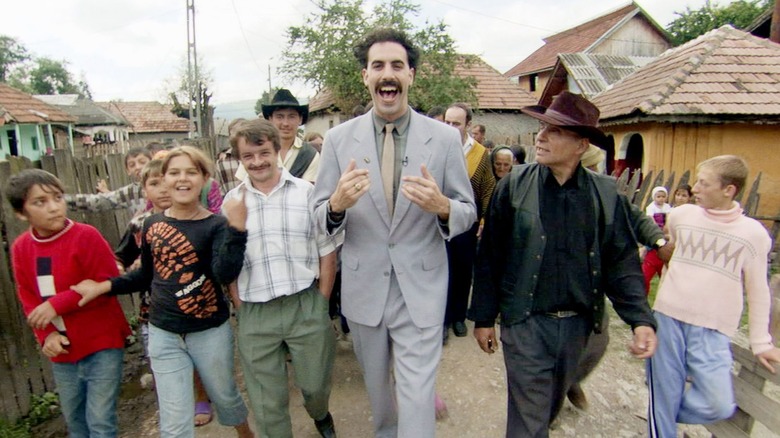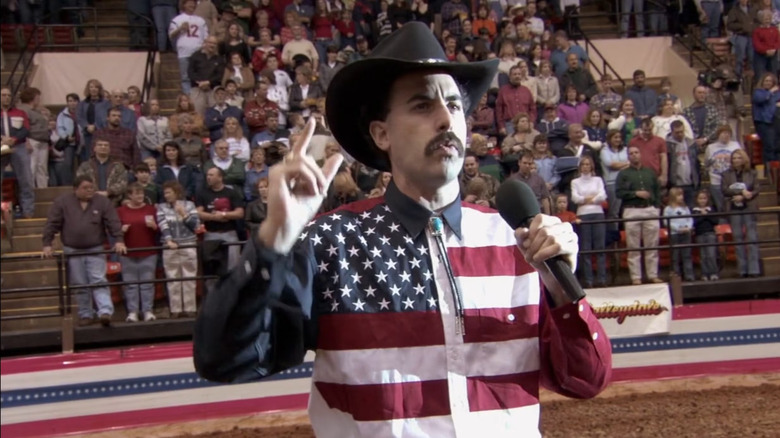The Outrageous Borat 'Sequel' That Never Saw The Light Of Day
The conceit of the 2006 comedy "Borat! Cultural Learnings of America Make Benefit Glorious Nation of Kazakhstan" is easy to understand on its surface. The title character (Sacha Baron Cohen) is a journalist from Kazakhstan who knows little about the United States, and he travels there to observe American culture. The film is staged in a series of documentary vignettes wherein Cohen, in character, grills various American citizens who live out on the Right-wing fringe. The goal was to see if he could spark a xenophobic response, often presenting his oddness (a national anthem about potassium, not knowing how toilets work, etc.) as mere cultural differences. "Borat" was released during the George W. Bush administration, a time when American was engaged in multiple overseas wars, and the filmmakers clearly wanted to expose how ignorant Americans were about other nations.
Perhaps the biggest joke of the film is that its depiction of Kazakhstan is wholly fictional. Kazakhstan is a real country, of course, a sizable mountain nation along the southern border of Russia. But director Larry Charles and Cohen depict Kazakhstan as a sexist, oppressive country that regularly engages in incest and public antisemitism. Borat also claims that the national drink of Kazakhstan is horse urine and that it's national dish is horse meat. This is very far from what the actual nation experiences.
Naturally, the government of Kazakhstan initially hated "Borat" for all its claims, feeling that the film would mislead ignorant Americans as to the true culture of their country. They eventually came around, though, using the film as a means of tourism publicity. Borat is funny! Now come see the real Kazakhstan! By 2016, everything was copacetic.
Before the eventual acceptance of the film, however, a Kazakh filmmaker named Erkin Rakishev had prepared a slightly more acidic response. Rakishev was said to have been writing and directing a 2011 satire of "Borat" called "My Brother, Borat" which flipped the script on Cohen and Charles. Sadly, it was never released.
A Kazakh filmmaker planned on making a Borat response film called My Brother, Borat
Back in 2010, Rakishev spoke with the BBC about his planned movie, feeling that too many people in American and England were taking "Borat" at face value. He said, "Every Kazakhstani who goes to the West feels uncomfortable to say where he or she is from. This is because people in the West associate the country with Borat's film." And this is a fair accusation. The point of Charles' and Cohen's film is that Americans are ignorant of other countries, and it proved to be correct. Sadly, Cohen and Charles chose a real country for Borat to be from, and they didn't care that they invented an offensive new stereotype along the way. Rakishev continued by saying:
"When [Cohen] made his film, it offended our nation. I think it crossed the line. Maybe they just wanted to joke, but they belittled, insulted and mixed us with dirt. They compared us to animals, showed us as barbarians and wild people. You say everybody understands that it was a joke. I don't think so because the majority of people believe in what they see and hear. So when they see this fictional film made by Borat – they believe it's true."
As such, "My Brother, Borat" was put into production and at least partially shot. The premise was to be an inversion of "Borat," in that an American journalist (named John) would travel to Kazakhstan, only to find that it is an exaggeratedly advanced utopia. John would spend most of his time with Borat's brother, a character named Bilo (Roman Khikalov), who was briefly mentioned in Charles' film, so Rakishev ran with it.
My Brother, Borat, like the original, was meant to be a little offensive
Rakishev noted in the BBC interview that he had filmed a few scenes already, and they were deliberately shocking and offensive, very much in the vein of Cohen's and Charles' film. There was to be a sexual assault film featuring a donkey and another scene wherein an old woman savagely beats the two main characters with a stick. That said, Rakishev wanted it known that he wasn't "going to such a low level of toilet humor" as the original. From the descriptions, "My Brother, Borat" wasn't going to be a semi-documentary like the original but a fully scripted movie.
Rakishev said that he had made multiple films in Kazakhstan just that year, although they haven't been released to an international market. One may recall the acclaimed film "Tulpan," as it was submitted to the Academy Awards in consideration for Best International Feature, but that was released in 2008. Kazakh films aren't widely distributed, sadly.
Just as sadly, it seems that "My Brother, Borat" completely disappeared after its mention on the BBC. Rakishev never came forth with a completed film, and nothing seems to have been screened anywhere in the world. One can theorize that 20th Century Fox sued for copyright infringement, although it's just as likely that Rakishev couldn't get funding to complete the movie. Any hope that Rakishev had to rebuke Cohen and Charles never came to fruition. And, as mentioned, Kazakhstan eventually came to accept "Borat" as a means to get the world looking in their direction, even if it was the worst possible representation for their country.
In 2020, Cohen returned for "Borat Subsequent Moviefilm: Delivery of Prodigious Bribe to American Regime for Make Benefit Once Glorious Nation of Kazakhstan." Only Rudy Giuliani and his supporters seemed to be upset by it.


